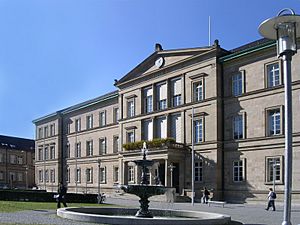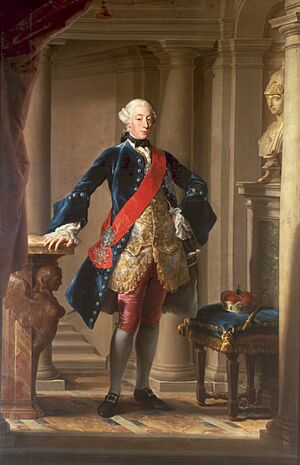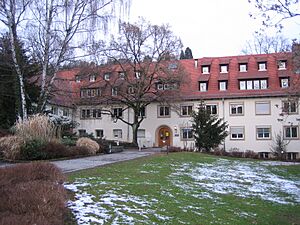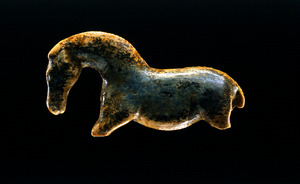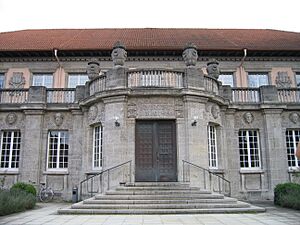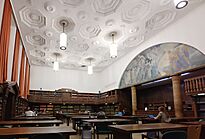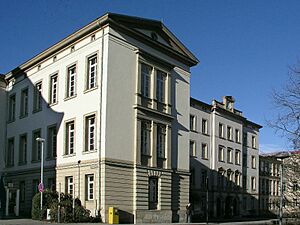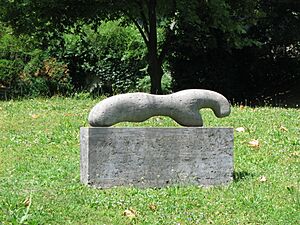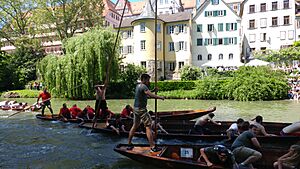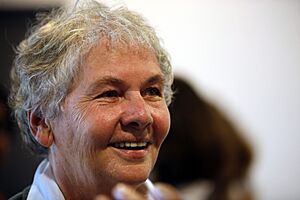University of Tübingen facts for kids
|
Eberhard Karls Universität Tübingen
|
|
 |
|
| Latin: Universitatis Tubingensis | |
| Motto |
Attempto!
|
|---|---|
|
Motto in English
|
I dare! |
| Type | Public |
| Established | 1477 |
|
Academic affiliation
|
U15, German Universities Excellence Initiative, Guild of European Research-Intensive Universities, MNU |
| Budget | € 766.5 million |
| Rector | Karla Pollmann |
|
Academic staff
|
6,146 |
|
Administrative staff
|
2,524 |
| Students | 28,619 (WS2023/24) |
| Undergraduates | c. 16,150 (WS2023/24 |
| Postgraduates | c. 12,469 (WS2023/24) |
| c. 2,000 (WS2023/24) | |
| Location |
,
Baden-Württemberg
,
Germany
48°31′30″N 09°03′32″E / 48.52500°N 9.05889°E |
| Campus | Urban (University town) |
| Colours | |
The University of Tübingen, also known as the Eberhard Karl University of Tübingen, is a big public university in Tübingen, Germany. A public university means it is funded by the government. It is a place where students go to learn and researchers work to discover new things.
This university is one of the top "Excellence Universities" in Germany. It is well-known for studying many subjects. These include plant biology, medicine, law, old cultures, and philosophy. More recently, it has become a leader in artificial intelligence. Many famous people have studied or taught here. These include presidents, a pope, and the famous scientist Johannes Kepler. The university is also linked to eleven Nobel Prize winners, especially in medicine and chemistry.
Contents
- History of the University
- University Name and Debates
- What the University Researches
- University Campus
- University Museum
- University Libraries
- How the University is Organized
- University Rankings and Reputation
- Student Life at Tübingen
- Notable People from the University
- Famous Quotes About Tübingen
- Images for kids
- See also
History of the University
How the University Started
The University of Tübingen was founded in 1477. It was started by Count Eberhard V. He was a leader who wanted to improve society and the church. He became very interested in learning during his trips to Italy. The first head of the university was Johannes Nauclerus.
The university got its current name in 1769. Duke Karl Eugen added his first name to the founder's name. The university then became the main university for the kingdom of Württemberg. Today, it is one of nine state universities in Baden-Württemberg, Germany.
Important Thinkers and Discoveries
The University of Tübingen has a history of new ideas, especially in theology (the study of religion). Philipp Melanchthon, who helped create the German school system, was important here. Many famous people have been students or teachers at Tübingen. These include the astronomer Johannes Kepler and Pope Benedict XVI. Other important figures were the poet Friedrich Hölderlin and the philosophers Friedrich Schelling and Georg Wilhelm Friedrich Hegel. These three philosophers were even roommates!
In the mid-1800s, the university became very famous. This was thanks to people like the poet Ludwig Uhland. The "Tübingen School" of theologians also started here. They studied old religious texts in new ways. In 1863, Tübingen was the first German university to create a faculty for natural sciences. DNA was discovered here in 1868 by Friedrich Miescher. Christiane Nüsslein-Volhard, a German woman who won the Nobel Prize in medicine, also works at Tübingen.
Since the late 1990s, important research on mRNA has happened at Tübingen. This research has helped create new treatments, including vaccines like those for COVID-19.
During the Nazi Period
During the Nazi period, the university did not have many Jewish teachers or students. This was even before the Nazi Party came to power in 1933. The university did not strongly oppose the Nazi government's orders. Some professors were forced to leave their jobs. For example, physicist Hans Bethe was dismissed in 1933. The university hospital was involved in difficult medical practices during this time. There was not much resistance to the Nazi government at the university.
After World War II
After the war, important thinkers helped the university recover. In 1966, Joseph Ratzinger, who later became Pope Benedict XVI, taught here. In 1967, Jürgen Moltmann, a very important Protestant theologian, also became a professor.
In 1970, the university changed its structure. It was divided into different study and research departments. In 2007, the state of Baden-Württemberg started charging tuition fees. These fees were stopped in 2012. In 2009, students protested against these fees by occupying a main lecture hall. They wanted education to be free for everyone.
In 2010, Tübingen joined the Matariki Network of Universities. This is a group of universities from different countries. In 2022, Karla Pollmann became the first woman to be elected as the Rector (head) of the university.
University Name and Debates
The university is named after its founder, Eberhard I, Duke of Württemberg, and Duke Karl Eugen. Karl Eugen gave the university its current name in 1769.
Since the 1970s, there have been discussions about changing the university's name. Some students want to move away from the old traditions of naming the university after rulers.
In 1977, students even changed the sign on the main building to "Ernst Bloch University." This was to honor the famous philosopher Ernst Bloch who taught there.
In 2022, student groups asked to remove the names. The university asked historians to study the lives of Eberhard and Karl Eugen. The study found that Count Eberhard had negative views towards Jewish people. Duke Karl Eugen was a ruler who used his country's resources and people harshly. He even sold young men as soldiers to other countries for money. The historians noted that these actions were typical for their time.
Despite the report, the university's Senate voted against changing the name. A two-thirds majority was needed to change it, but it did not pass.
What the University Researches
The University of Tübingen does a lot of research in many areas. In science, important research happens at the Hertie Institute for Clinical Brain Research. This institute studies the brain and its diseases. The Centre for Interdisciplinary Clinical Research focuses on cell biology to help diagnose and treat organ diseases.
In the arts, Tübingen has the only faculty of rhetoric in Germany. This department was started by Walter Jens, a famous writer. The university is also known for its long history of research in philosophy, theology, and the study of languages. Since the 1800s, Tübingen has been a world leader in studying prehistoric times and ancient cultures. This includes studying the ancient Near East and continuing excavations at Troy.
The university also has a large coin collection. It is one of the biggest in Germany.
University Campus
The University of Tübingen is not a single campus. Its buildings are spread out across the town. Tübingen is one of Germany's classic "university towns." This means the university is a big part of the town's life.
There are four main areas where university buildings are located:
- Old Town: Some older buildings in the historic part of Tübingen are used by smaller humanities departments. The old medieval castle, Schloss Hohentübingen, is also used by the university.
- Wilhelmstraße Area: This area has larger humanities departments and the university's main offices. The main university library and a large dining hall are also here.
- Morgenstelle Campus: A newer campus for science subjects was built here in the 1970s. It also has a big dining hall.
- Klinikum: The university's teaching hospitals are located here. There are 17 hospitals with 1,500 patient beds. They treat many patients each year.
Students can find housing provided by the Tübingen Studentenwerk (student services). The largest student housing areas are in Waldhäuser Ost and Französisches Viertel.
University Museum
In 2006, the Museum of the University of Tübingen (MUT) was created. It helps organize and show the university's many old collections. These collections come from all different subjects. The museum aims to show these collections to the public and use them for research.
The MUT is located at Hohentübingen Castle. Here you can find the castle laboratory and collections of ancient cultures. Highlights include ancient animal figures and an Egyptian burial chamber. The Botanical Garden and Paleontological Collection are also popular.
The MUT is special because it holds artifacts that are part of the UNESCO World Heritage. These include some of the oldest known art and musical instruments made by humans. They come from the Vogelherdhöhle cave in the Swabian Jura.
University Libraries
The University Library of Tübingen is open to everyone, not just university students. It has over three million books and more than 7,600 journals. There are also over 80 smaller libraries for different departments. These have another three million books.
The main library is on Wilhelmstraße. It has several connected parts:
- The Bonatzbau: This is the oldest building, built in 1912. It has a historical reading room and the university's old records.
- The Main Building: Built in 1963, this part has the information desk and computers to search for books.
- The Ammerbau: This is the newest part, built in 2002. It lets users directly access over 300,000 books and current newspapers. It also has many study spaces.
How the University is Organized
University Faculties
The university has seven main faculties, which are like big departments. Some of these are divided into smaller sections.
- Protestant Theology
- Catholic Theology
- Law
- Medicine
- Humanities (studies of human culture)
- Economics and Social Sciences
- Science
University Leadership
The university is run by three main groups:
- The Rectorate: This is the executive team that manages the university. The current Rector is Professor Karla Pollmann. She works with four deputies.
- The Senate: This group makes the university's rules. It includes the Rectorate members, deans, and elected members from professors, teachers, students, and staff.
- The University Council: This council has 13 members, including its president and external members.
University Rankings and Reputation
| University rankings | ||||||||||
|---|---|---|---|---|---|---|---|---|---|---|
| Overall – Global & National | ||||||||||
|
||||||||||
The University of Tübingen is highly ranked around the world. In 2025, the QS World University Rankings placed it 213th globally and 11th in Germany. The Times Higher Education World University Rankings for 2025 ranked it 95th globally and 8th in Germany. The Academic Ranking of World Universities (Shanghai Ranking) for 2023 put Tübingen in the top 151–200 universities worldwide.
Since 2012, Tübingen has been one of eleven "German Excellence Universities." This award brings extra money for research. In 2018, Tübingen was one of the top three universities in Germany for research.
According to the German Research Foundation (DFG) report from 2018, Tübingen was ranked 8th overall for research funding. It was 4th in humanities and social sciences, and 6th in life sciences (including medicine). This shows the high quality of its research.
US News Best Global Universities also ranked Tübingen among the top ten universities in Germany in 2021. Tübingen is especially strong in humanities, theology, religious studies, medicine, and law. Its Law School is considered one of the best in Germany.
Research Controversies
Since 2018, the university has been part of a big artificial intelligence research project called Cyber Valley. Large companies like Google and Amazon have invested in this project. This has led to some criticism from student and activist groups. They are concerned about universities working with companies that might be involved in military research.
Student Life at Tübingen
Students make up about one-third of Tübingen's population. So, student life is a big part of the town's culture. Things can get quieter during university holidays, especially in the summer.
About 30 student groups, similar to fraternities, are linked to the university. They are known for their parties and a yearly boat race on the Neckar river. Some of these groups have faced criticism for their political views. The university itself stays neutral on these issues. However, all Tübingen fraternities are separate from groups that have been criticized for extreme views.
The university also has many student clubs for arts and politics. There are choirs and student theatre groups. Radio Uniwelle Tübingen is the university's radio station. Students produce programs for it every week.
The university offers many gym and sports classes called Hochschulsport. Students can join different sports teams or do individual sports. Even unusual sports like parachuting are offered. Students can take these classes for free or at a lower cost.
Student discounts are not very common in Tübingen. But students can get a Semesterticket. This is a cheap public transport pass that allows unlimited travel on trains and buses for six months. The Landestheater Tübingen (theater) and public swimming pools also offer student discounts.
Tübingen's nightlife includes many pubs in the old town and some clubs. During the semester, the Clubhaus hosts a popular weekly party called Clubhausfest. Student groups organize this free party, and the money raised helps their activities.
Notable People from the University
The University of Tübingen has many famous alumni (former students) and staff. As of 2023, eleven Nobel Prize winners are linked to the university. Many important politicians, including German presidents and European Commissioners, have studied here.
Because Tübingen has a strong law school, many of its alumni have become important judges. These include judges at Germany's highest courts.
In religious studies, many influential theologians have been connected to Tübingen. These include Pope Benedict XVI and Philip Melanchthon. Philosophers like Friedrich Wilhelm Joseph Schelling, Friedrich Hölderlin, and Georg Wilhelm Friedrich Hegel also studied here. Tübingen is sometimes seen as the home of "German idealism," a philosophical movement that greatly influenced modern thinking. After World War II, philosophers like Ernst Bloch helped improve the university.
Nobel Prize Winners
Here are some faculty members and alumni who have won the Nobel Prize:
- William Ramsay (1904, Chemistry)
- Eduard Buchner (1907, Chemistry), faculty
- Karl Ferdinand Braun (1909, Physics), faculty
- Fritz Pregl (1923, Chemistry)
- Adolf Butenandt (1939, Chemistry), faculty
- Hans Bethe (1967, Physics), faculty
- Georg Wittig (1979, Chemistry), faculty
- Hartmut Michel (1988, Chemistry)
- Bert Sakmann (1991, Medicine)
- Christiane Nüsslein-Volhard (1995, Medicine), faculty
- Günter Blobel (1999, Medicine)
Famous Quotes About Tübingen
- "Tübingen does not have a university, Tübingen is a university." – Walter Jens
- "One need merely say 'Tübingen Seminary' to understand what German philosophy is at bottom: an insidious theology. The Swabians are the best liars in Germany: they lie innocently." – Friedrich Nietzsche, 1888
Images for kids
See also
 In Spanish: Universidad de Tubinga para niños
In Spanish: Universidad de Tubinga para niños
 | Selma Burke |
 | Pauline Powell Burns |
 | Frederick J. Brown |
 | Robert Blackburn |


